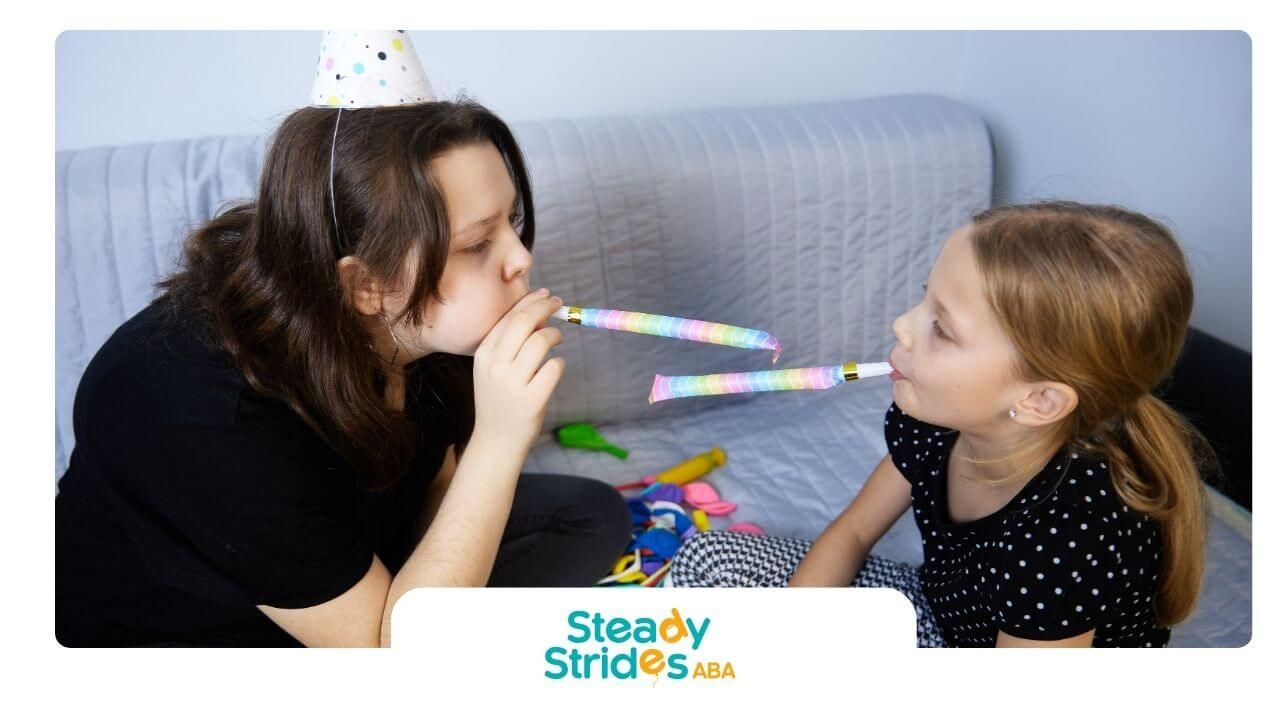Growing up with autistic people in your family brings complexities that shape everyone’s daily life. You might notice how family relationships often require extra compassion, patience, and understanding. These challenges can sometimes feel overwhelming, but you are not alone. Many siblings of autistic individuals experience similar emotions, from confusion to appreciation of their brother’s unique qualities. This blog aims to offer support, share practical guidance, and remind you that with compassion, you can find ways to strengthen family bonds and foster a caring environment.
Understanding the Challenges of Having an Autistic Brother
Dealing with an autistic sibling can present daily challenges, especially when misunderstandings arise within the family. You may often feel isolated or unsure how to respond to certain behaviors associated with autism.
Adjusting to these realities means acknowledging that your experiences are valid. The impact of an autistic brother shapes not just your routine but also your emotional life. By exploring the common hurdles siblings face, you can begin to find effective strategies that make family life more manageable.
Common Emotional Reactions Siblings Experience
It’s completely natural to go through a range of emotions when you have an autistic sibling. You might sometimes feel angry, left out, or even jealous if it seems like your parents give your brother more attention. At other times, sadness or confusion may set in, especially when misunderstandings happen or when your brother’s needs seem to come before your own.
If you’re in a similar situation, compassion toward yourself is crucial. Many siblings report frustration or guilt over losing patience with their autistic brother. As Bridget shared about her sister, “Even now I still find it hard to deal with… I sometimes slip and get into a bad mood—but hey, I can’t be perfect all the time.” These feelings are very common.
Is it normal to struggle with empathy or patience as a sibling? Absolutely. Most siblings of autistic people sometimes find it hard to maintain empathy or stay patient. Family life with autism is full of ups and downs, and your feelings are valid. Reaching out for support and talking about your emotions can help you move forward with greater understanding.
Recognizing Stress Triggers in Family Dynamics
Stress in families with an autistic sibling often comes from a mix of daily routines and unexpected behaviors. Sometimes, even small changes or misunderstandings can quickly lead to tension at home. Identifying what sparks this stress can help you and your family respond more positively.
Signs of stress in family life may include:
- Loud outbursts or sudden changes in your brother’s behavior
- Arguments over chores or attention from parents
- Feeling overwhelmed by caregiving responsibilities
- Frustration when plans have to change unexpectedly
By recognizing these triggers, you can start to put coping mechanisms in place. Having honest conversations with your parents, teachers, or a trusted adult can lighten the emotional load. Remember, understanding your stress points is the first step to finding balance and support.
Autism Explained: What Every Sibling Should Know
Gaining a clear understanding of autism is vital when you have an autistic sibling. Knowing why your brother behaves in certain ways helps reduce misunderstandings and builds greater empathy within your family.
When you learn more about autism, you can better explain it to others and advocate for your sibling. This knowledge also helps you see the strengths and challenges your brother faces, making it easier to connect, offer support, and approach family life with patience and compassion.
Key Traits and Behaviors Associated With Autism
Autism affects behavior and communication in many different ways. Your brother may experience the world uniquely, leading to actions or preferences that seem unusual if you’re not familiar with autism.
Some autistic people have strong interests in specific hobbies or topics, while others may struggle with changes in routine or understanding social cues. Sensory sensitivities—such as strong reactions to noise, lights, or touch—are also common. These behaviors aren’t intentional; they’re part of how your sibling experiences the world.
| Trait/Behavior | What This Might Look Like |
|---|---|
| Communication differences | Speaking less, repeating phrases, or using gestures |
| Repetitive behaviors | Lining up toys, hand-flapping, and strict routines |
| Sensory sensitivities | Covering ears, avoiding certain textures or foods |
| Focused interests | Deep knowledge in hobbies like trains or animals |
| Social challenges | Trouble understanding jokes or sharing interests easily |
Recognizing these different things helps prevent misunderstandings and supports a more compassionate family environment.
How Autism Impacts Sibling Relationships
Having an autistic sibling shapes family relationships in unique ways. You may feel protective of your brother, but sometimes disappointed if he doesn’t want to play or communicate in the same way as you do. It’s common for misunderstandings to happen, especially when your brother’s behavior seems unusual or unpredictable.
Family life often requires extra patience, as your parents might focus more on your autistic sibling’s needs. This can lead to feelings of being overlooked, or even guilt when you wish things were easier. It’s important to remember that these emotions are normal and shared by many others in a similar situation.
Despite the challenges, these relationships can teach you compassion and resilience. As you learn more about autism, you’ll find ways to communicate better and develop a unique bond with your brother, even if it doesn’t look like other sibling relationships.
Practical Coping Strategies for Siblings
Finding practical strategies to manage your emotions and daily responsibilities is essential when you are the sibling or carer of an autistic brother. It’s easy to feel overwhelmed, but small adjustments can make a big difference for everyone involved.
Engage in hobbies or activities that help you recharge and cope with stress. You may also benefit from reading about others in similar situations online or joining support groups. Step by step, these coping techniques can help you find comfort in your family role while maintaining your own sense of self.
Setting Boundaries and Managing Difficult Moments
Establishing boundaries is key to maintaining your own wellbeing. You might need space during overwhelming moments, or time away when your brother’s behavior becomes too much. Clear communication with your parents or carer about your limits is vital.
Helpful steps include:
- Letting your family know when you need a break
- Designating a quiet space in your home for yourself
- Reaching out to support groups or the internet to share experiences and get advice
- Exploring different things that calm you—like listening to music or going for a walk
It’s perfectly acceptable to seek support outside the family, especially if you feel stretched thin. The internet offers numerous communities and resources for siblings who need to connect or learn about coping strategies. Don’t hesitate to protect your mental health by setting boundaries that work for you.
Finding Healthy Ways to Express Frustration
Frustration is a common feeling when you’re navigating family life with an autistic sibling. Channeling these emotions in healthy ways not only eases your stress but also fosters compassion for yourself and your brother.
Some siblings find it helpful to write or talk about their feelings, either in a journal or with a trusted friend. Creative outlets like painting, music, or sports can also provide a much-needed release. “I just retreated to my room or left the house if I could,” shared one sibling, highlighting the importance of having a safe space.
Exploring hobbies allows you to recharge and gain perspective. If you know someone in a similar situation, connecting with them can make it easier to open up. Remember, expressing frustration does not mean you love your brother any less – it simply shows you care about your own wellbeing, too.
Building a Positive Relationship With Your Autistic Brother
Nurturing your connection with your autistic sibling brings long-term rewards. Family relationships grow stronger when you show compassion and seek out meaningful interactions. While the journey isn’t always smooth, small efforts can transform everyday moments into positive experiences.
Focusing on shared hobbies or activities that interest both of you can help bridge communication gaps. Being present and patient demonstrates support, even when misunderstandings arise. As you invest in your relationship, you’ll discover unique ways to connect and share joy within your family.
Creating Meaningful Interactions
Building memories with your autistic sibling starts by finding activities you both enjoy. Even if your brother communicates or behaves differently, shared experiences create space for understanding and connection.
Consider these approaches for meaningful interactions:
- Explore hobbies that excite your sibling, like trains, music, or art
- Create simple routines or games you can do together
- Use clear communication and celebrate small achievements
- Learn about your brother’s favorite things to foster shared joy
Patience is essential—sometimes you’ll need to adapt your expectations or try different things. Remember, meaningful time doesn’t always have to be long or complicated. Even short moments of laughter or cooperation can build a stronger bond and enrich your family life.
Balancing Family Time and Personal Needs
Maintaining harmony between family life and your own needs can be tricky when you have an autistic brother. You may feel responsible for helping your mum or carer, but it’s also necessary to protect your personal space and interests.
Communicate openly with your family about what you need—whether it’s quiet time, help with schoolwork, or the freedom to pursue your hobbies. Schedule individual activities that allow you to unwind and recharge. If possible, arrange for respite care or ask a trusted adult to spend time with your sibling, giving you some well-deserved downtime.
Remember, looking after yourself helps you be a better support for your family. Balancing your own needs with your responsibilities as a sibling is not selfish—it’s an important part of maintaining healthy family relationships and sustaining compassion.
Seeking Support When It Feels Overwhelming
There may be times when living with an autistic sibling feels like too much to handle on your own. Support groups and connecting with people in a similar situation can ease feelings of isolation. The internet is full of communities and information specifically for siblings of autistic people.
If you ever feel overwhelmed, don’t hesitate to seek professional help. Therapists, counselors, and specialized organizations can provide valuable guidance and reassurance. Reaching out is a sign of strength, and it can help you and your family find new ways to thrive together.
Reaching Out for Professional Help
When family life starts to feel unmanageable, professional help can make a real difference. Therapists or counselors are trained to support siblings of autistic children, offering strategies to cope with stress, misunderstandings, and emotional challenges. Many support groups specialize in autism and welcome siblings, providing a safe space to share experiences.
What resources are available for siblings of autistic children in the US? Several organizations can help. For example, the National Autistic Society and Sibs offer advice and online communities, while the Autism Response Team provides direct support. You can also seek help from local mental health professionals or school counselors.
Joining a support group or accessing resources through the internet is an important step toward self-care. Remember, asking for help is not a sign of weakness—it’s how you build resilience and maintain healthy family relationships.
Connecting With Sibling Support Groups
Support groups designed for siblings create a sense of belonging and understanding. These spaces let you meet others in a similar situation who truly “get it,” which can be incredibly comforting. Through the internet, you’ll find local and national groups focused on sibling support.
Benefits of joining a sibling support group include:
- Sharing stories with people who have firsthand experience in family life with autism
- Learning practical coping strategies and tips for managing daily challenges
- Building friendships that extend beyond the group setting
- Getting advice on how to improve communication and strengthen family relationships
Most support groups are easy to find online, and many offer both in-person and virtual meetings. Whether you’re looking for emotional support, advice, or simply a place to vent, these groups provide the understanding and encouragement you need.
Conclusion
Having an autistic brother can come with unique challenges that deeply affect sibling relationships and emotional well-being. It's essential to recognize and validate your feelings while also understanding the intricacies of autism. Building a positive relationship involves creating meaningful interactions and setting personal boundaries. Embracing these strategies can help alleviate the stress and frustration that may arise in family dynamics. Remember, seeking support is not a sign of weakness but a step toward better managing the complexities you face. If you're feeling overwhelmed, don't hesitate to reach out for professional help or connect with sibling support groups where you can share experiences and gain insights. You're not alone on this journey.
This article bravely addresses the often-unseen challenges faced by siblings of autistic individuals, emphasizing the critical need for support. At Steady Strides ABA, we understand that supporting one child means supporting the entire family unit. Our holistic approach provides not only expert, individualized ABA therapy for your autistic child, fostering crucial skills and independence, but also offers invaluable resources and guidance for siblings and parents. We help create a more harmonious home environment by promoting understanding, teaching effective communication strategies, and building consistent routines that benefit everyone. Choose Steady Strides ABA for a compassionate partner dedicated to helping your whole family find steadier footing and experience collective progress and well-being.
Frequently Asked Questions
How can I cope when I feel resentful toward my autistic brother?
Feeling resentful of your autistic sibling is common and doesn’t make you a bad person. Coping involves acknowledging your emotions, discussing them with someone you trust, seeking support groups, and finding healthy outlets for your feelings. Understanding your brother’s behavior and focusing on self-care can help improve family relationships.
What resources are available for siblings of autistic children in the US?
Siblings can access support groups such as Sibs, the National Autistic Society, and the Autism Response Team. These resources help connect you with others in a similar situation, offer practical advice, and provide online forums to discuss autism, carer responsibilities, and family life.
Is it normal to struggle with empathy or patience as a sibling?
Yes, it’s normal for siblings of autistic people to struggle with empathy or patience. These emotions result from misunderstandings and the demands of family life. Remember, developing compassion and seeking help when needed are healthy responses, and many siblings feel the same way.
Sources:
https://www.autismspeaks.org/blog/my-reality-growing-severely-impacted-autistic-brother
https://www.autism.org.uk/advice-and-guidance/topics/family-life-and-relationships/family-life/siblings
https://pmc.ncbi.nlm.nih.gov/articles/PMC11592025/#:~:text=The%20perception%20that%20time%20and,to%20be%20effective%20%5B17%5D.
https://www.researchgate.net/publication/7000521_Adjustment_sibling_problems_and_coping_strategies_of_brothers_and_sisters_with_autistic_spectrum_disorder_Journal_of_Intellectual_and_Developmental_Disability_31_77-86













